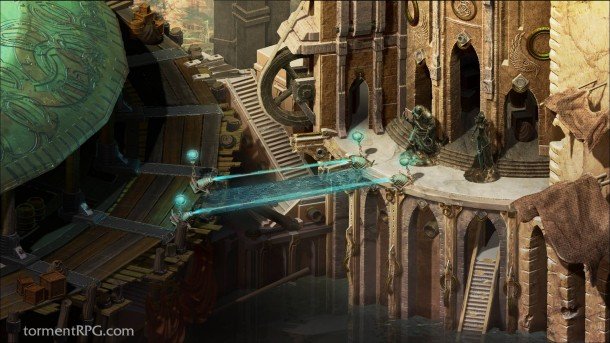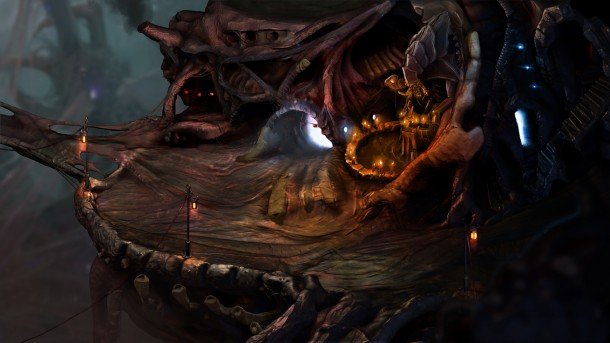
PC Gamer: So, Colin, as someone who's been doing this for a while, what do you see as the area that has progressed the most in terms of game storytelling? At least as long as you've been doing it. And where would you liked to see it go from here?
"I think that game stories have, in some senses, become less involving."
McComb: I'm going to try to word this diplomatically, because I said something unfortunate in a different interview, and I realize that it sounded really jerky afterwards. I had to make some apologies. I think that game stories have, in some senses, become less involving. With the advent of full voice acting, it's really locked a lot of possibilities down, where people could extend things out. The growth of cinematics and movies is actually sort of a handicapping factor. I would like to see us return to an era where text is more important again. This might just be old-fogeyism happening here, but I really like the text-based games. I grew up on the Infocom games. I'm a huge fan of the original Wasteland. Fallout, Fallout 2, the original Baldur's Gates, Icewind Dale, Planescape: Torment… I guess I had to say that one. [laughs] I would like to see more reading in games and less, “Here's a grand vision.”
That's interesting to hear, because some people have kind of perceived the lack of full voice acting in some of these–not just with you guys, but with Obsidian too–as being a product of not having a big publisher budget. But it sounds like you're saying it might be more of a focused decision.
McComb: In some cases, that's actually very true. When you do voice acting… Yeah, it's a higher budget, but you also have to get that script in early, so you can get your actors early, and you can commit them into the studio. Then, if you discover something has happened with the development of the gameplay, you are shackled unless you can get that same actor back in to voice the parts in the same voice. You're basically stuck with the lines you've got, and you have to find a way to work around that.
Rothfuss: I haven't lived on the inside, but I've been living on the outside playing these games for the better part of 30 years. I think that in some ways, it's not so much the text. Although I do love the text. But when you read something, you have the freedom to read it in any way you want. You can read that voice in your head however you like. It's kind of the same way that, at a certain point, realism becomes counterproductive…
McComb: Let me interrupt here very quickly and let me say that you can see this, for instance, in Lord of the Rings. Gandalf is now Ian McKellen. Tyrion is now Peter Dinklage. We can't see him in any other way.
Rothfuss: Yeah. Similarly, if you think about a great, classic movie. Think about how they did movies back in the day. Some of these real classics, they didn't have a lot of special effects. How did they make a great movie? They had a great script and great actors. If you didn't have both of those, you had nothing. I watched Harvey the other day, and I thought, “All of this is carried on the weight of the words and the performance.” Nowadays they'd have $100 million and they'd put a big CGI rabbit in the end. It would lose so much of the story, because they wouldn't care about the quality of the actor anymore.
Keep up to date with the most important stories and the best deals, as picked by the PC Gamer team.
They wouldn't care nearly as much about the quality of the story and the words. Because they were focused so much on some of these other elements. So for me, every time I think about this game, I get excited. Because so much of the focus is on the narrative. As humans, we love stories. Every game that you remember, you remember because of the story. Five years later, you don't go, “Wow, do you remember that game that had that great explosion?” You remember narrative things. You remember character things. You remember times you were shocked or amazed or emotionally impacted.
McComb: In Grand Theft Auto: San Andreas, I was totally blown away by the jacking-people-in-their-car mechanic. I had a lot of fun playing as this character with this emergent gameplay. You made up your own story with it as you went along, as opposed to, “Oh, also the flame effects were really great.”

"[Video games are] making the mistakes Hollywood made 30 years ago."
The flip side of that question, that I kind of alluded to: Where do you think game storytelling can go forward here? Where would you like to see it go?
Rothfuss: It's easy for me, because I haven't seen the sausage being made. I honestly don't understand some of the difficulties underneath it all. So I can talk about what I want and not worry too much about how practical it is. But the truth is, video games are such a new genre of storytelling. They're just teenagers at this point. It's so new, and they're making all their bold, brave newbie mistakes. They're making the mistakes Hollywood made 30 years ago. In the same way that comics have matured–because comics are much older than video games–comics are out of their adolescence now, and this brilliant storytelling that's happening with comics is taking advantage of what that medium can do that no other medium can.
Right now, video games are kind of trying to be movies. That's great, but a video game can never be as good a movie as a good movie. I think the real opportunity that's presented is immersion in a story and the interactive nature of that story. Those are the two things that video games can do… They have the opportunity to do so much more of it than movies can. The more they explore those and the better they get at that, the better the games will be. Otherwise they're just going to continue to be second-rate movies.
McComb: I think that we can get deeper into the reactivity. We can explore more mature themes. We don't have to be all about the big guns and the explosions and the "Gee whiz, wow!" effects. We can tell some really deep stories. We can focus on delivering a human experience that people will be interested in and enthralled by, because it will be something that is real. But we can also transport people to another world in which this stuff takes place. It'll help them examine their own lives through that prism. That's where I would like to see stories go in games.
Rothfuss: Yeah. So much of what can happen in a novel can happen in a video game. You have the opportunity for escapism. And don't knock escapism. It sounds a little dirty, but we all need to get away every once in a while. Video games also offer us the benefit of experience without the burden of experience. We can do things in a consequence-free environment. We can live lives other than our own without having to face the long-term consequences of these things. That's incredibly gratifying.
McComb: Although I would point out that I was reading a comment from somebody online today who was saying, “I really hope this is a similar experience to Planescape: Torment, because when I went through that game, some of those choices I made, I would lie in bed at night and think, 'What sort of a person have I become?'”
Rothfuss: I know people talk that way about the Walking Dead game… I still have to play that, but people are saying…
McComb: I love it. It is so good.
"It's a legitimate storytelling avenue. It's not a book. It's not a movie. It's a game."
Rothfuss: I think they have started to walk down that road of… It's that mirrored escapism. It's a different experience.
McComb: It's a legitimate storytelling avenue. It's not a book. It's not a movie. It's a game. I think that people are really starting to get that now, that it's an entirely different experience from either of those things. And it is, at the same time, a completely legitimate experience.
Rothfuss: I think we're fighting to prove that, when we really all agree about it. [laughs] We're trying to prove it, too, because anyone who has played at least a handful of games has had an experience and seen a sliver of how incredible this could be. But we're still figuring out how best to do it.
McComb: Sure. And Walking Dead did it great.
Before we wrap up, do you guys have anything else you wanted to talk about in relation to Torment, the Kickstarter, or game storytelling?
McComb: I would say that...in regards to Kickstarter, I am incredibly grateful and entirely humbled by the support that people are showing to us in this project. We've got four days left at this point. I hope that more people can come aboard so we can expand the depth and the reactivity of the storyline, and really deliver something that's going to be worthy of the Torment name for them. We're going to do that anyway, but every additional bit helps.
We appreciate Colin and Patrick taking the time to talk to us. For more on Torment and the RPG Renaissance, check out our interviews with fellow Tormentors, inXile's Brian Fargo and Obsidian's Chris Avellone . The Torment Kickstarter ends in just about a day as of the writing of this, with some pretty significant stretch goals still on the board.
Len Hafer is a freelancer and lifelong PC gamer with a specialty in strategy, RPGs, horror, and survival games. A chance encounter with Warcraft 2: Tides of Darkness changed her life forever. Today, her favorites include the grand strategy games from Paradox Interactive like Crusader Kings and Europa Universalis, and thought-provoking, story-rich RPGs like Persona 5 and Disco Elysium. She also loves history, hiking in the mountains of Colorado, and heavy metal music.

